
Pierre Juquin (born 22 February 1930 in Clermont-Ferrand) is a French communist politician and trade unionist.

Pierre Juquin (born 22 February 1930 in Clermont-Ferrand) is a French communist politician and trade unionist.
The son of an SNCF employee, he is a graduate of the École Normale Supérieure (ENS), and was a teacher of German at the Lycée Lakanal in Sceaux between 1959 and 1966. A classmate of Emmanuel Le Roy Ladurie (at ENS), Juquin joined the French Communist Party (PCF), and was a candidate in the municipal elections of 1959 as well as a regional leader for the PCF in Seine. A collaborator of Georges Marchais, he was admitted as observer to the PCF Central Committee, and defended the official party line inside the Union des Étudiants Communistes. He was also a prominent member of the Syndicat National des Enseignants du Second Degré (SNEF, a teachers' union, in which he helped the communists gain a decisive say).
He was elected to the French National Assembly for Essonne and, in 1967, became a full member of the PCF Central Committee. Voted out of the Essonne seat in 1968, he regained the position in 1973 - and was re-elected until 1981; an observer to the Politburo in 1979, he joined the body in 1982, and was assigned leadership of the press and propaganda bureau.
He was excluded from the Politburo in October 1984, and publicly disagreed with decisions taken at the 25th Party Congress of February 1985. His opposition was tolerated until October 1987, when he was excluded from the Party altogether - after he had expressed his wish to run for French Presidency on his own platform.
Thus, Juquin ran in the 1988 presidential election [1] with backing from the Unified Socialist Party (PSU) and the Revolutionary Communist League, grouping some former PCF members, Trotskyists, various Greens, and independent left-wingers. Juquin only managed to obtain 2.08% of the vote. His movement survived as the New Left for Socialism, Ecology and Self-management, which fused with the PSU to form Red and Green Alternative (nowadays known as Les Alternatifs ) Juquin joined the Greens in 1991.

The Greens was a centre-left to left-wing green-ecologist political party in France. The Greens had been in existence since 1984, but their spiritual roots could be traced as far back as René Dumont's candidacy for the presidency in 1974. On 13 November 2010, The Greens merged with Europe Ecology to become Europe Ecology – The Greens.

France is characterised by numerous political trends. This article provides an overview of some of them.

Robert Hue is a French politician who was National Secretary of the French Communist Party (PCF) from 1994 to 2001 and President of the PCF from 2001 to 2002. He served as a Deputy in the National Assembly of France from 1997 to 2002, and he has served in the Senate of France between 2004 and 2017.
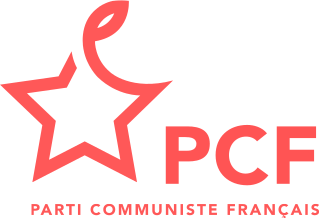
The French Communist Party is a political party in France which advocates the principles of communism. The PCF is a member of the Party of the European Left, and its MEPs sit in the European United Left–Nordic Green Left group.
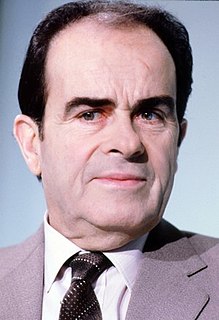
Georges René Louis Marchais was the head of the French Communist Party (PCF) from 1972 to 1994, and a candidate in the French presidential elections of 1981.

The Unified Socialist Party was a socialist political party in France, founded on April 3, 1960. It was originally led by Édouard Depreux.

Waldeck Rochet was a French communist politician. He was General Secretary of the French Communist Party (PCF) from 1964 to 1972.
The Epinay Congress was the third national congress of the French Socialist Party, which took place on 11, 12 and 13 June 1971, in the town of Épinay-sur-Seine, in the northern suburbs of Paris. During this congress, not only did the party admit the Convention of Republican Institutions into its ranks, but the party leadership was also won by Mitterrand and his supporters. For the observers and the French Socialists themselves, the Epinay Congress was the real founding act of the current PS. It was also the turning point in Mitterrand's grand political plan, which led to the ascendancy of the French Left over the next quarter-century, and eventually, in 1981, to Mitterrand's election to the Presidency of France for two consecutive 7-year terms.
The Gauche Plurielle was a left-wing coalition in France, composed of the Socialist Party, the French Communist Party, the Greens, the Left Radical Party, and the Citizens' Movement. Succeeding Alain Juppé's conservative government, the Plural Left governed France from 1997 to 2002. It was another case of cohabitation between rival parties at the head of the state and of the government. Following the failure of the left in the 2002 legislative election, it was replaced by another conservative government, this time headed by Jean-Pierre Raffarin.

Antoine Waechter is a French politician, leader of the Independent Ecological Movement.
The Democratic and Republican Left group is a parliamentary group in the National Assembly including representatives of the French Communist Party (PCF) as well as leftist parties with bases in Overseas France.

The Martinican Communist Party is a political party in the French département d'outre-mer of Martinique. Georges Erichot is the general secretary of the party.
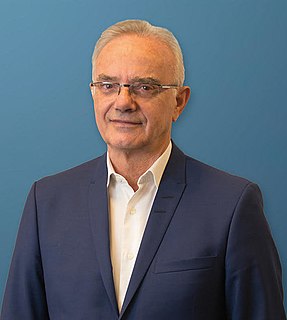
François Asensi is a French politician who has served as the Mayor of Tremblay-en-France since 1991 and served as Member of the National Assembly for Seine-Saint-Denis' 11th constituency from 1988 to 2017.

The Left Front was a French electoral alliance and a political movement created for the 2009 European elections by the French Communist Party and the Left Party when a left-wing minority faction decided to leave the Socialist Party, and the Unitarian Left, a group which left the New Anticapitalist Party. The alliance was subsequently extended for the 2010 regional elections and the 2012 presidential election and the subsequent parliamentary election.

Christian Lamothe, better known with his pseudonym Christian Picquet, is a French activist and politician. He is the leader of the new Unitarian Left party.

The Socialist Party is a centre-left, social-democratic, political party in France. It holds pro-European views. The PS was for decades the largest party of the French left and used to be one of the two major political parties in the French Fifth Republic, along with The Republicans. It replaced the earlier French Section of the Workers' International in 1969 and is currently led by First Secretary Olivier Faure. The PS is a member of the Party of European Socialists, Progressive Alliance and Socialist International.
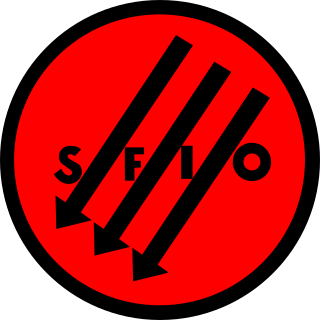
The French Section of the Workers' International was a political party in France that was founded in 1905 and succeeded in 1969 by the modern-day Socialist Party. The SFIO was founded during the 1905 Globe Congress in Paris as a merger between the French Socialist Party and the Socialist Party of France in order to create the French section of the Second International, designated as the party of the workers' movement.
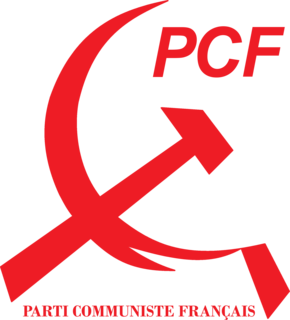
The French Communist Party has been a part of the political scene in France since 1920, peaking in strength around the end of World War II. It originated when a majority of members resigned from the socialist French Section of the Workers' International (SFIO) party to set up the French Section of the Communist International (SFIC). The SFIO had been divided over support for French participation in World War I and over whether to join the Communist International (Comintern). The new SFIC defined itself as revolutionary and democratic centralist. Ludovic-Oscar Frossard was its first secretary-general, and Ho Chi Minh was also among the founders. Frossard himself resigned in 1923, and the 1920s saw a number of splits within the party over relations with other left-wing parties and over adherence to the Communist International's dictates. The party gained representation in the French parliament in successive elections, but also promoted strike action and opposed colonialism. Pierre Sémard, leader from 1924 to 1928, sought party unity and alliances with other parties; but leaders including Maurice Thorez imposed a Stalinist line from the late 1920s, leading to loss of membership through splits and expulsions, and reduced electoral success. With the rise of Fascism this policy shifted after 1934, and the PCF supported the Popular Front, which came to power under Léon Blum in 1936. The party helped to secure French support for the Spanish Republicans during the Spanish Civil War, and opposed the 1938 Munich agreement with Hitler. During this period the PCF adopted a more patriotic image, and favoured an equal but distinct role for women in the communist movement.

Legislative elections in France were held on 11 and 18 June 2017 to elect the 577 members of the 15th National Assembly of the Fifth Republic. They followed the two-round presidential election won by Emmanuel Macron. The centrist party he founded in 2016, La République En Marche! (LREM), led an alliance with the centrist Democratic Movement (MoDem); together, the two parties won 350 of the 577 seats—a substantial majority—in the National Assembly, including an outright majority of 308 seats for LREM. The Socialist Party (PS) was reduced to 30 seats and the Republicans (LR) reduced to 112 seats, and both parties' allies also suffered from a marked drop in support; these were the lowest-ever scores for the centre-left and centre-right in the legislative elections. The movement founded by Jean-Luc Mélenchon, la France Insoumise (FI), secured 17 seats, enough for a group in the National Assembly. Among other major parties, the French Communist Party (PCF) secured ten and the National Front (FN) obtained eight seats. Both rounds of the legislative election were marked by record low turnout.
Christine Prunaud is a French politician. She served as senator for Côtes-d'Armor from 2014 to 2020.